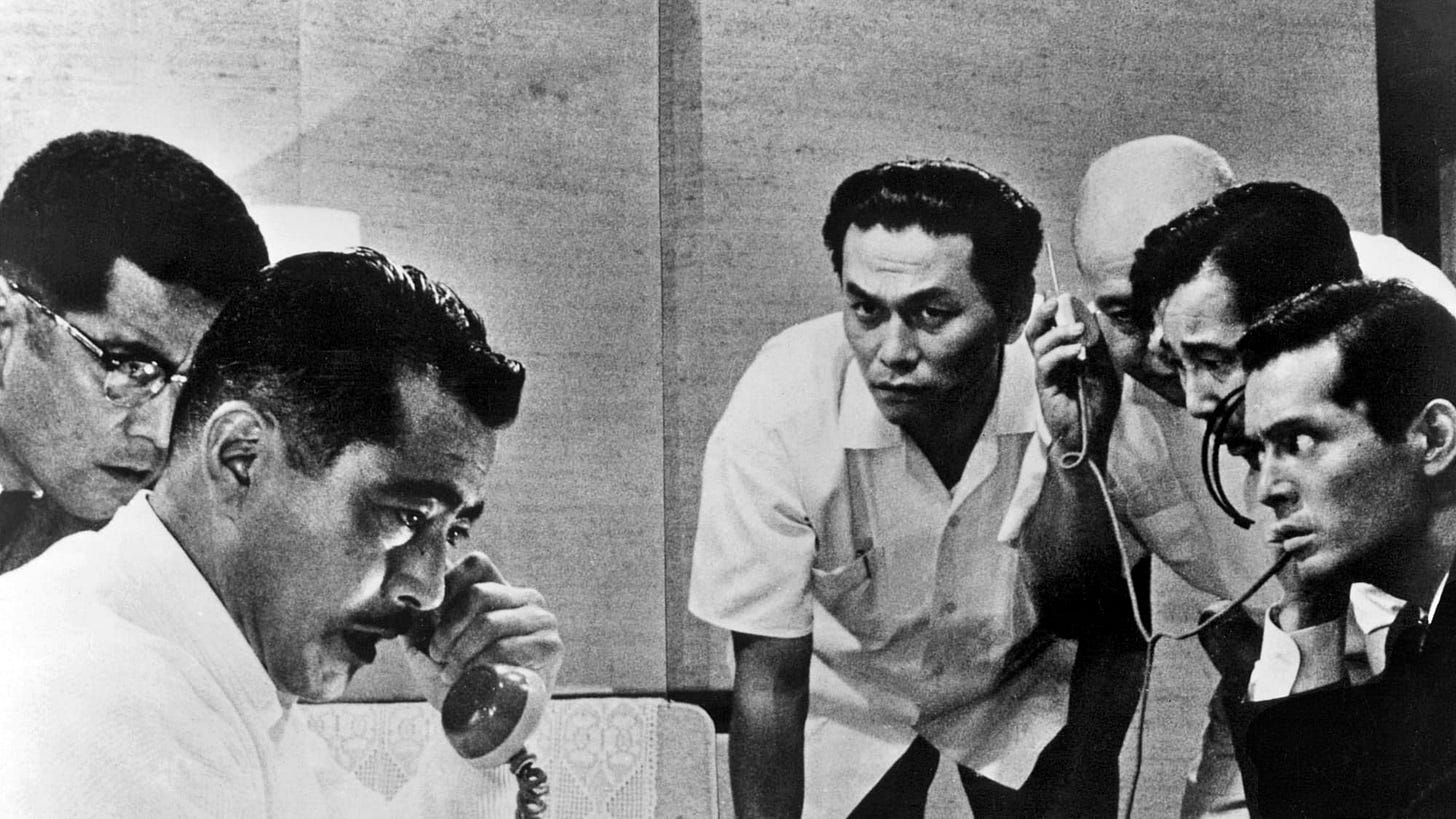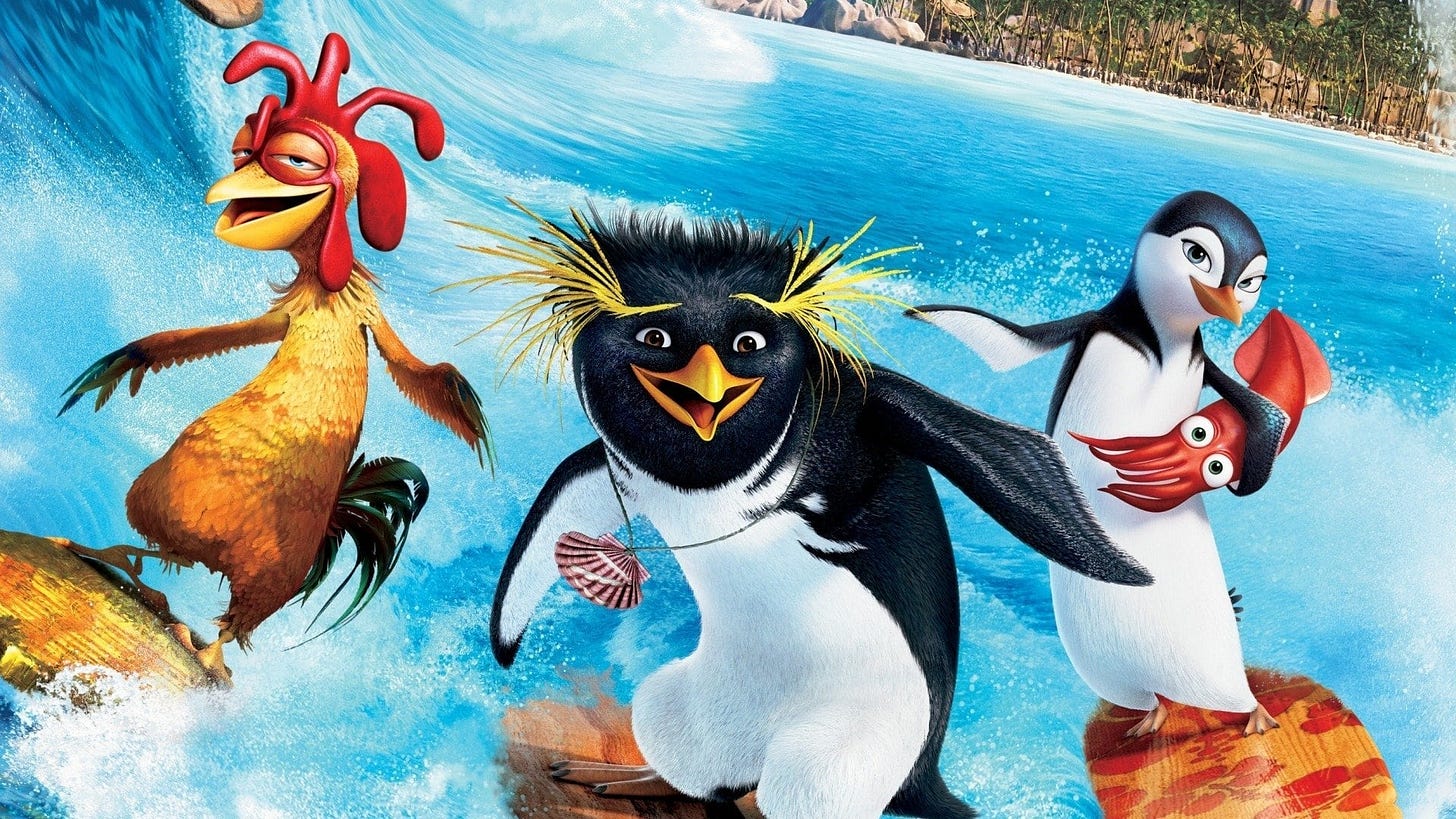Weekly Watches: August 14, 2024
Sharing Our Team's Recent Discoveries: Weekly Watches with 100 Movies Every Catholic Should See
High and Low (1963)
Directed by Akira Kurosawa. Starring Toshirō Mifune.
By
The name Akira Kurosawa brings to mind samurai films. But, constraining him to this specific genre would do a great disservice to one of the most renowned directors in cinematic history. Amongst the vast array of settings and backdrops he used in his films, Kurosawa often found himself returning to contemporary Japan. High and Low is his best-known work in this setting and has garnered unanimous praise. Part of the critical success of the film comes from the adaptation of Western source material, an American pulp mystery novel, King’s Ransom, from which Kurosawa cherry-picked the very best thriller and noir elements to mix with his own perspective and concoct a truly riveting narrative.
The film follows Gondo (Mifune), a successful executive at a Tokyo shoe company, who, in the midst of plotting to buy the majority of shares in his company and assume control, receives a phone call that his son has been kidnapped. As it turns out, there was a mistake, and the boy kidnapped is actually the son of Gondo’s chauffeur. Nonetheless, the kidnapper demands a ransom amounting to Gondo’s net worth, jeopardizing an entire life of hard work geared toward owning the shoe company. With that, the narrative is off to the races with gripping suspense and a web of moral dilemmas. It becomes a story of oppositions as Gondo is forced to choose between two very different paths.
The ethical quandaries that Gondo must navigate set High and Low above the typical procedural thriller. He is forced to weigh the value of a human life against the wealth he spent a lifetime building. I’ve enjoyed how Kurosawa often plays with these themes (as in Yojimbo), forcing his protagonist to descend from a strong position of security to risk losing it all in defense of the helpless and innocent. It is this conflict between the high and low paths that really gives this story weight. Contrasts create dynamic storytelling. Imbalance naturally catalyzes conflict. High and Low is chock-full of these polarities, starting with the very title itself, which in the original Japanese reads “Heaven and Hell.” The film examines differences across the spectrum, from Japanese societal classes, to different moral codes one can choose, to even the very topography of Gondo’s high-rise against the kidnapper’s squalid apartment.
This is a film you do not want to miss. Kurosawa is an undisputed master. Everything I’ve had the chance to see from him has been nothing short of remarkable. You will not be disappointed.
The Fabulous Baron Munchausen (1964)
Directed by Karel Zeman. Starring Miloš Kopecký.
By
If there was ever a film that deserved to have every frame displayed in an art gallery, my vote is for The Fabulous Baron Munchausen. Created by legendary Czech animation wizard Karel Zeman (who does, in fact, have an art museum in Prague dedicated to his work), the 1962 fantasy adventure is an explosion of cinematic ingenuity that packs a daft amount of visual splendor in its brisk 83-minute runtime. Zeman was a master of various animation mediums, and placed real actors against matte paintings, stop-motion techniques, Schüfftan mirrors, and paper puppetry to create an eye-popping spectacle that doesn’t just mimic storybook worlds of old, but lovingly creates a real moving storybook world on screen from antique parts.
Appropriately, the tall-tale narrative of the legendary braggart Baron Munchausen is enamored with an idealized past. Not interested in making historical or political commentary, Zeman’s film is an upbeat, optimistic lark that traverses the fantastical historical landscapes with childlike innocence and wonder, heightened by Zeman’s old-fashioned practical effects work that makes the film feel older than it is (he owes a creative debt to silent film artist George Méliès). It’s a film about looking back into the past with joy, even turning the titular Baron into a possible stand-in for Zeman himself, an adventurous soul wholly uninterested in the present, fully content to revel in the excitement of the old world (and the visual craft of the silent age).
While the episodic story may not live up to the artistry, it undoubtedly works as a purely visual experience. His uncompromising artistic process influenced countless imitators including Wes Anderson, Terry Gilliam, and Tim Burton, all of whom point back to Zeman as inspiration for their own efforts to blend live-action with various animation mediums. Yet few can capture the exuberant, childlike joy of Zeman’s toy-box cinema.
The Sympathizer (2024) (HBO Miniseries)
Directed by Don McKellar and Park Chan-wook. Starring Hoa Xuande and Robert Downey Jr.
By
The Sympathizer is an HBO miniseries about a communist spy embedded in the American Vietnamese refugee community after the Vietnam War. The show is an adaptation of Viet Thanh Nguyen’s Pulitzer prize-winning novel of the same name and has been on my radar since I listened to an interview about it on the radio earlier this summer. I finally got to watch the first episode on a recent flight, and came in expecting to learn a lot about a distinct community I grew up around in Southern California. I ended up nearly falling out of my chair because the story had me on the edge of my seat from the first scene to the last scene. While I hear the book is worthy in its own right, it’s immediately evident that show runners Park Chan-wook and Don McKellar have taken Nguyen's historical fiction source material and turned it into a tight, engrossing, black comedy drama.The show relentlessly covers heady and heavy subjects touching on the trauma of war, ideology, identity, and morality, explorations which on their own, keep the show intellectually stimulating.
The entire story itself is framed as the “confession” of the titular communist spy, given under duress in a Marxist reeducation camp. How did he end up on the wrong side of the Party? Is he still a true believer? Will he survive his ordeal? These are the dramatic questions hanging over the whole show as it marches through the events leading up to the chronological present. Catholics will enjoy seeing an unflinchingly honest, but still nuanced, portrayal of communists alongside an equally biting critique of the brutality and corruption on the American-aligned, anti-communist South Vietnamese side as well. The show is written with authenticity in mind for a Vietnamese audience, but the themes and crisis of conscience that drives the narrative will resonate with anyone who wants a stark reminder of how ideologies obscure the dignity of the human person and often disfigure our moral compass until we begin to wonder if we’re wasting our lives on the wrong cause.
Surf’s Up (2007)
Directed by Chris Buck. Starring Shia LaBeouf, Jeff Bridges, and Zooey Deschanel.
By
Surf’s Up is perhaps one of the most criminally underrated animated films to have released in the period in the 2000s when Pixar’s films were (rightfully) overshadowing pretty much everything else. Co-directed by Ash Brannon (co-director of Toy Story 2) and Chris Buck (Tarzan, Frozen), the film’s style- documenting, in cinéma vérité fashion the story of a young penguin trying to win a surfing championship- is one of the most unique approaches to an animated film I’ve ever seen. The script is hilarious and often plays jokes that you wouldn’t ever find in a ’Disney-fied’ production but being way smarter than your typical ’Illumination’ fare. Definitely a great film to watch with the family if you haven’t seen yet that will entertain both children and adults alike.











